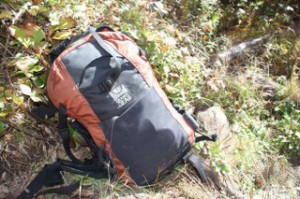Always Be Prepared in the BWCA
I have a day pack filled with items that I bring along when I go hiking, blueberry picking, day paddling or out in the fishing boat on Saganaga. I rarely use the items in the bag and lugging it around can sometimes be a hassle but it’s better to be safe than sorry. In addition to this bag I like to bring along whistles for the other people who are with me in the group, just in case. Here’s what you’ll find in my pack and a list from the Take Me Fishing Blog for boating.
- Bathroom Bag- shovel, wet wipes, toilet paper, antibacterial gel, dental floss, camp towel
- First Aid Kit- bandages, alleve, alcohol swabs
- Protection- bug spray, sunscreen, lip protection, rain poncho, emergency blanket, mosquito headnet, knife, hat, sunglasses, socks
- Light- head lamp, fire starter, matches, lighter
- Survival Kit- compass, whistle, duct tape, rope, signalling device, Glide, needle nose, clippers
- Water- water bottle, filter, crystal light
- Other- food, diet coke, notebook, pens, camera, deck of cards
Anything you can think of to add?
22 Essentials to Bring Aboard for a Day of Boating
The day before a boating or fishing trip can be busy considering the planning that is required. Take full advantage of the time you spend on the water by being adequately prepared for a variety of situations that may come up. It’s fairly easy to avoid bug bites, motion sickness, hungry kids and soggy shorts. Just print or write down this handy list of 22 items to bring along before heading out on the boat.
- Boat registration. Be sure to have your valid boat registration certificate along with you. It’s one of the most important boating essentials since it proves that you are following the state law regarding operation of the vessel.
- Waterproof camera. There are several different types of waterproof cameras out on the market these days. If you spend a considerable amount of time boating, they are well worth the investment.
- Cell phone or marine radio. Always have a cell phone or marine radio on board in case of emergency. Know how to reach the marine patrol, police, and Coast Guard.
- Change of clothes. Boat wakes and unexpected weather can mean wet, uncomfortable clothes. Pack a change of clothes in large zip lock or plastic bag.
- Cooler. You can keep your water, sodas, snacks and fish cold by bringing an airtight cooler along on the trip.
- Fire extinguisher. All vessels are required to have a fire extinguisher on board. Educate yourself on the safety requirements for your particular state.
- First aid kit. Buy a waterproof first aid kit that includes gauze pads, bandages, scissors, rubber gloves, cotton, antiseptic lotion, aspirin, and tweezers.
- Fishing license. Have a copy of your fishing license with you, and be informed on the current fishing regulations in your state.
- Hand sanitizer or wipes. Hand sanitizer is good to use after handling bait or fish.
- Hat. Wear a hat with a wide brim or visor whenever possible to keep the sun off of your face.
- Insect repellant. If you are outdoors, there will be bugs. Keep the scratching at a minimum by packing the insect repellant.
- Lip balm with high SPF. Lips can get sunburned just as easily as the rest of our bodies and are often overlooked. Find a lip balm with a high SPF (SPF 20 to 30).
- Motion sickness pills. Avoid unexpected queasiness and bring a pack of motion sickness pills or crystallized ginger (which also helps keep sensitive tummies calm).
- Non-perishable snacks. Beef jerky, fruit roll-ups, granola bars, mixed nuts or frozen grapes all make good snack options when spending the day on a boat.
- Personal floatation device. Educate yourself on the laws regarding personal floatation devices in your state. All passengers are required to wear a USCG-approved personal floatation device that provides buoyancy.
- Rain gear. Rain showers and thunderstorms can come up quickly when out on the lake or ocean. Stay as dry as possible by having a rain jacket and rain pants on board.
- Sunglasses. They don’t have to be fashionable, but should be polarized and capable of cutting the glare from the water.
- Sunscreen. The sun’s rays are stronger the water, making it easier to get burned. Be sure to buy sunscreen with broad-spectrum protection and a high SPF.
- Sweatshirt. Early mornings and evenings on the water are often cool (even during the summer months), so bring along a light jacket or sweatshirt.
- Towel. Keep a towel in a plastic bag to dry off with at the end of the day.
- Visual Distress Signals. Visual distress signals allow boat operators or passengers to signal for help in the event of an emergency. Know which types of VDSs are requirements for the type of boat you will be boarding.
- Water. Bring along several bottles of water for each person so that dehydration doesn’t become an issue.
– See more at: http://blog.takemefishing.org/22-essentials-to-bring-aboard-for-a-day-of-boating/?utm_source=vsilverpop&utm_medium=email&utm_campaign=augnewsnonmember&spMailingID=6826802&spUserID=NTMyNjAxMDk0MjES1&spJobID=85510237&spReportId=ODU1MTAyMzcS1#sthash.kQsHTsaV.dpuf

